
Dental Implants – Cleveland, TX
The Last Tooth Replacement
You’ll Ever Need
When it comes to tooth replacement, dental implants are universally considered to be the gold standard, both by patients as well as dental professionals. Why the agreement? Because when it comes to strength, aesthetics, and durability, the only thing that tops dental implants are natural teeth. At our office, Dr. Guillory can use this state-of-the-art treatment to replace any number of teeth for a lifetime, helping a patient put their tooth loss behind them permanently. To find out more about this procedure and what it could do for you, contact us today to schedule a consultation to discuss tooth replacement with dental implants.
Why Choose New U Dentures and Implants for Dental Implants?
- Entire Implant Procedure Completed Under One Roof
- Experienced Dentist That Utilizes the Latest Technology
- 100% Customized Treatment Plans for Every Patient
What is a Dental Implant?

A dental implant isn’t a replacement tooth, but rather a prosthetic tooth root. A small titanium post is placed within the jawbone where a natural tooth used to reside, where it will bond with the surrounding bone through a natural process called osseointegration. At this point, a crown, bridge, or denture can be attached on top, essentially replicating all parts of a natural tooth. To date, no other treatment does this, and it’s why dental implants are truly in a class of their own.
The 4-Step Dental Implant Process

Unlike other restorations, implants require a multi-step treatment that spans several months. Still, you can trust their perks make such time and effort worthwhile! Our team even performs placement in-house to ensure the new teeth work correctly. That’s only natural, as Dr. Guillory is highly experienced in tooth replacement and belongs to the American Academy of Implant Dentistry. So, you can expect four main steps from our implant process: consultation, surgery, osseointegration, and delivery of the final restoration.
Initial Dental Implant Consultation

Indeed, the implant process’ first step is a consultation with Dr. Guillory. This visit lets our office learn your treatment goals, health history, and general background. That way, we can confirm whether you qualify for implants and tailor the final results to suit your needs.
Of course, our team can still help if you aren’t a good implant candidate at first. We’ll work with you to complete preliminary procedures, from gum disease therapy to tooth extractions. That way, your mouth will have the support it needs to handle implants.
Should we approve treatment, this initial consult will also cover the details of implant work. In other words, it’d guide you on the implant procedure’s timeline, cost, and other such factors.
Dental Implant Surgery

Again, our office’s approach is to place implants in-house. Doing so means avoiding the hassle of outside specialists located far away. If you’re a returning patient, this setup also ensures our team can access your dental records instantly.
When you see us for the implant surgery, you’ll undergo:
- Anesthesia – Before the treatment, Dr. Guillory will numb your mouth with a local anesthetic. This step will keep you from feeling pain during the surgery. Instead, the most you’ll sense is a slight pressure as our staff operates.
- A Minor Incision – When the relevant site is numb, the dental team will make an incision in your gums. This small cut creates a space for your future implant(s).
- Implant Placement – Our team will place your implant following the incision, all while using advanced methods and tools.
- Gum Closure – After the placement, we’ll close the incision in your mouth. Dr. Guillory will then put a cap over your implant post.
Dental Implant Osseointegration & Abutment

Once the surgery is over, your implant(s) will gradually fuse with your jawbone. This process is called osseointegration and usually takes 4-6 months. At the time of completion, it’ll make your implant a permanent and stable part of your mouth.
Following the osseointegration, you’ll receive an additional surgery that places your abutment. (An abutment is a metal connector that holds an implant’s tooth-like portion.) As you recover from this procedure, the final restoration will be crafted from prior dental impressions.
Delivery of Dental Implant Restoration(s)

Delivery of the final restoration is the last step of the implant process. Given the number of teeth you’ve lost, said prosthetic might be a crown, bridge, or denture.
Ultimately, fitting your final restoration won’t take long. The dentist simply needs to apply a special cement. From there, you can enjoy your newly restored smile with confidence.
Benefits of Dental Implants

Dental implants are widely regarded as the gold standard of tooth replacement by both dentists and patients. Why? As the only tooth replacement option that replaces both the roots and the crowns of a missing teeth, this revolutionary solution offers many important benefits that you simply can’t get with traditional options like dentures or dental bridges. In fact, dental implants have the potential to significantly improve your health, confidence, and quality of life. Read on as we go over some of the most popular reasons why our patients love dental implants.
Day-to-Day Benefits

- Stability you can count on: Because dental implants are held within the jawbone just like real teeth, you will never have to worry about your new teeth becoming loose or slipping out of place while you eat or talk.
- Dramatically improved biting force: Dentures only restore about 30% of your biting power, which limits which foods you can eat comfortably. Dental implants restore 85% or more natural biting power, allowing you to easily eat apples, steak, nuts, and anything else on your plate!
- Incredibly natural-looking and feeling results: Dental implants mimic natural teeth in virtually every way, so they’re practically indistinguishable from the rest of your smile once placed. Plus, they’re so comfortable, stable, and natural-feeling that you may forget they’re even there!
Health Benefits

- Preserve your jawbone, facial features, and remaining teeth: Dental implants are the only tooth replacement option that encourages circulation in the jaw, which stops the bone loss that is common after tooth loss. Not only does this keep your jawbone from shrinking away, but it helps keep your remaining teeth firmly in place and supports your facial features to prevent a sunken, aged appearance.
- Better oral and overall health: Dental implants are easy to keep clean and promote better oral health, minimizing your risk of issues like cavities and gum disease. They also don’t rely on other parts of your smile and cause gum irritation or tooth sensitivity like dentures and dental bridges do. Studies show that keeping your mouth healthy can lower your risk of developing health problems like cardiovascular disease, memory issues, arthritis, diabetes, and more.
Long-Term Benefits

- A long-term solution: Traditional bridges and dentures lose their fit over time and need to be replaced every several years. On the other hand, dental implants are designed to last 30+ years. In fact, with the right care, most patients can expect their dental implants to last a lifetime!
- An investment that pays for itself: Initially, dental implants cost more than dentures or dental bridges. However, they can easily become the more cost-effective option with time. There’s no need to constantly pay for extra cleaning supplies, adhesives, extra dental visits, or pricey replacements, which can literally save you thousands of dollars! Plus, studies show that dental implants can help lower the cost of your oral and overall healthcare.
Who Dental Implants Can Help
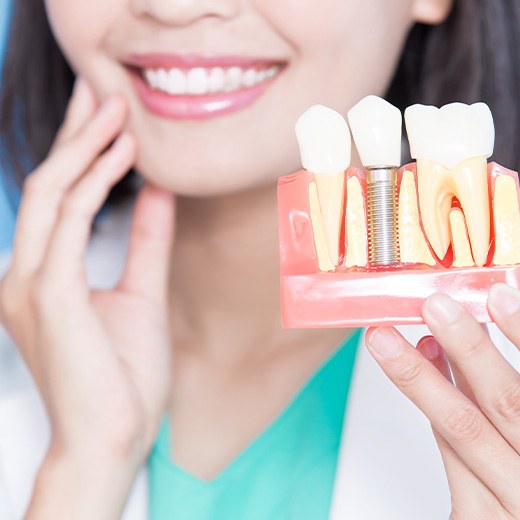
Potentially, anyone who has lost one, several, or all of their teeth can get dental implants to restore their smile’s appearance and functionality. However, before proceeding, you must consult with Dr. Guillory to ensure you’re a good candidate for the procedure. If you’re not, you may need to undergo additional services so you can move forward. Then, based on his findings and your unique dental condition, he’ll recommend an appropriate solution to meet your needs.
Continue reading to learn more about what dental implants can help, and please contact us with any additional questions.
Who Is a Good Candidate for Dental Implants?
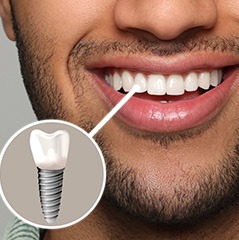
Almost any healthy adult can get dental implants, but there are three characteristics that must be met to be considered an ideal candidate for this type of restoration. They are:
- Commitment to oral hygiene. Cavities and gum disease can result in implant failure, so it’s essential to maintain a consistent dental hygiene routine at home.
- Good overall health. These prosthetics are surgically placed into your jawbone, so your body must be well enough to undergo the procedure.
- Sufficient jawbone density. After tooth loss, your jaw starts to thin without a root in place to stimulate new bone growth. Without enough support, your implants can’t be successful. Sometimes, an additional bone graft is necessary to bulk up your jaw to proceed.
Missing One Tooth
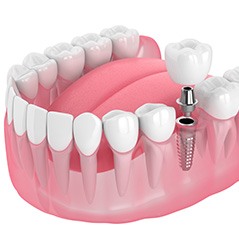
If you’ve only lost a single tooth, it can be seamlessly restored with an individual implant that’s sturdier than a bridge and doesn’t require removing enamel from healthy teeth to serve as an abutment. Instead, a titanium rod will be placed in the space left behind by your missing tooth. After a few weeks or months, your bone tissue fuses with this pole for added strength and stability.
Once you’ve fully recovered, our team will cap it with a fully customized dental crown that looks just like the tooth that fell out.
Missing Multiple Teeth
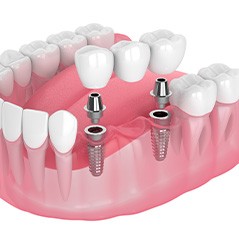
For those who have lost several teeth in a row, two implants can be placed on each side of the gap in your grin to support a dental bridge. These restorations can restore one to several teeth simultaneously but don’t require healthy teeth on each end like a traditional bridge.
It’s also possible to anchor partial dentures to your implants to replace multiple missing teeth from various places throughout your mouth, if necessary.
Missing All Teeth
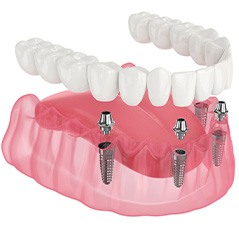
Patients who have lost all their teeth might benefit from implant dentures. This technique involves strategically placing anywhere from 4 to 6 titanium rods in your jawbone. Then, our team provides a specially designed set of dentures that anchor to them to rebuild an entire arch all at once. Unlike standard dentures, your prosthetics are not intended to be removed and won’t become dislodged during a meal or conversation.
Understanding the Cost of Dental Implants

Because every dental implant treatment Dr. Guillory provides is personalized for each patient based on their needs, the cost is always different. The number of implants needed, the type of prosthetic they will support, and the necessity for preparatory procedures can all influence the final price. No matter what your specific needs may be, it’s important to recognize that dental implants are a fantastic long-term investment for your oral health.
Preliminary Treatments & Dental Implant Surgery
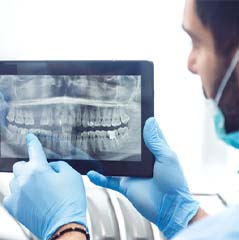
Certain procedures may be needed before dental implant treatment can be viable. This includes gum disease therapy, tooth extractions, and bone grafting, all of which will increase the cost of your tooth replacement overall. Furthermore, surgery incurs its own unique cost and can increase depending on how complex your needs may be. Since we keep the entire process in-house, you can expect your fees to be more compact and easy to understand, rather than having to accommodate fees from an outside oral surgeon.
The Parts of Your Dental Implant
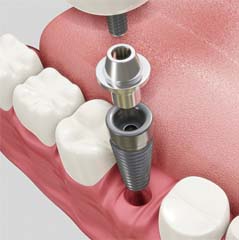
The more implants you need to have placed, the more materials we will need to replace your tooth roots. In this case, more titanium is needed, increasing your total cost. However, the price of implants can also vary depending on the brand or manufacturer you receive them from. If you have questions about the specific implants we use or why we choose to use them, feel free to let us know during your consultation.
Final Dental Implant Restoration

When additional implants are needed to replace teeth, more complex restorations need to be made to make your smile complete. For example, single implants only need one implant crown to restore them. In comparison, a pair of implants will need an implant bridge, while a series of implants (anywhere between four and six) will need an implant denture. Not only are more materials required to create these restorations, but more time is needed to ensure it fits properly and blends in with your existing teeth, if applicable.
Does My Dental Insurance Cover Dental Implants?

In most cases, dental insurance does not offer coverage for dental implants. With that said, there are some exceptions. For one, insurance plans can sometimes offer coverage for preparatory treatments needed to make dental implants possible. For example, bone grafting, gum disease therapy, or the restorations themselves can receive partial coverage. Our team is ready to help you maximize any benefits you want to use, so don’t be afraid to ask for help!
Making Dental Implants Affordable

We’ll go over all cost information when you come to see us for a consultation, plus we can discuss financing options so the treatment fits comfortably into your budget. Options our office recommends for dental implants include CareCredit, American Finance, and Lending Club. These third-party financiers allow you to pay for dental services on a monthly basis, usually with low to no interest attached to these patients. At the end of the day, we want to help you achieve your oral health needs without making you break the bank along the way.
Dental Implant Post-Op Instructions

We’re able to complete the entire dental implant process from start to finish in our office. You will be given specific post-op instructions after your procedure to help you remain comfortable and heal quickly. Continue reading to learn more about what you can expect from the healing process and when you should give us a call.
What to Do Directly After Dental Implant Surgery

You may not be looking forward to the dental implant placement procedure itself, but when you take all the right steps, you can make the healing process go much quicker and more smoothly. Be sure that you are in accordance with the following.
- Instead of spitting, use tissues or swallow excess saliva.
- Do not use a straw when drinking.
- Avoid tobacco products immediately following your surgery.
- Do your best to keep fingers and your tongue away from the surgical site.
Common Side-Effects When Recovering from Dental Implant Placement

It’s normal to experience some side effects for the first few days after your surgery, but they are usually pretty mild. Here are some common ones that you may come across:
- Bleeding: Intermittent bleeding, which can be lessened with gauze and light pressure, can last for multiple days.
- Swelling: Inflammation is common for the first 72 hours, and it can sometimes last over a week. Cold compresses can help to reduce this.
- Soreness: The area may be sore for a few days, but this can be managed by taking pain medication as directed.
All of these effects should be temporary and gradually subside as time goes by. If that is ever not the case, let us know.
Your Diet After Dental Implant Surgery

You should be mindful of your diet for several days following your procedure. Here are some foods that you may want to stock up on in advanced:
- Mashed potatoes
- Yogurt
- Ice cream
- Pudding
- Soup
- Scrambled eggs
- Pasta
As soon as your discomfort subsides, you can switch back to your normal diet. However, it’s still a good idea to avoid chewing directly on the surgical site.
Post-Op Health & Oral Hygiene
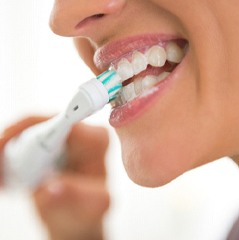
It’s crucial that you keep your mouth clean after your surgery. This way, the implants will have a better chance of integrating with your jawbone successfully. Here are some tips that can help:
- Brush your teeth the day after your surgery, but you should remember to be especially careful near the surgical sites.
- Rinse your mouth two to three times a day with saltwater. Use a prescription mouth rinse if you were provided one.
- Stay away from mouthwashes that contain high levels of alcohol.
What to Do After your New Teeth Are Attached

Once your smile is healed up and the implants have fused with your jawbone, the hard part is complete. When your dental crown, bridge, or denture is attached to the implant(s), you might experience some mild sensitivity, but this is easy to control with over-the-counter pain relievers, and it is completely temporary. There shouldn’t be any bleeding, swelling, or extensive recovery.
Maintaining & Caring For Your Dental Implants

Dental implants have the ability to last for several decades (and even for life) when you take the right steps to maintain them every day. Thankfully, caring for your dental implants is not as complicated as you might think. In fact, the at-home maintenance for your dental implants is very similar to that of your natural teeth. Below, you can read more about the best tips to keep your dental implants (and the rest of your mouth) as healthy as possible.
Make Oral Hygiene a Priority

The restorations attached to your dental implants (as well as the implants themselves) cannot develop decay because they are made from inorganic material. However, the gum tissue surrounding the implant can still become infected and cause your tooth replacement to fail. For that reason, brushing twice a day and flossing daily are vital. Using a water flosser to loosen food debris and rinsing your mouth with an alcohol-free oral rinse ensures a more thorough routine as well.
Eat a Healthy Diet

The foods you eat can make a larger impact on your oral health than you may realize. For example, eating large amounts of food high in sugar and starch make it easier for oral bacteria to produce plaque. This irritates the mouth and increases your risk for developing gum disease and tooth decay. On top of practicing consistent oral hygiene, you’ll want to eat foods conducive to oral health. That includes fruits, vegetables, lean proteins, and dairy products. Staying hydrated also helps keep saliva production high and keeps the mouth clean.
Break Bad Habits

Your dental implants are extremely durable, but that does not mean you should let bad habits damage them. Just like how you wouldn’t with your natural teeth, you should not use your teeth as a tool. Instead, have the right tool nearby to perform tasks like trimming your fingernails and opening packages or bottles. Avoid biting pens, pencils, ice cubes, or other foods that shouldn’t be chewed on (i.e. hard candy, popcorn kernels, etc.)
Protect Your Dental Implants

It’s important to stay active, but you don’t want to participate in activities that put your smile at risk without the right protection. For example, sports like football, basketball, wrestling, karate, soccer, and others can put your smile at risk of sudden impact. In fact, playing sports without a mouthguard is one of the most common causes of dental emergencies. Additionally, you should wear a nightguard if you grind or clench your teeth while sleeping as you could damage your restoration or implant without it.
Schedule Regular Dental Checkups

Maintaining routine checkups and cleanings is essential to protecting the long-term health of your dental implants. Visiting every six months gives our office a chance to examine remaining teeth and your dental implants for any issues as early as possible. If problems do present themselves, treating them early will always be easier than if they have a chance to develop.
Dental Implant Failure & Salvage

We often recommend dental implants because of the many benefits they offer, including their impressive success rate. This procedure succeeds in more than 95% of cases! Of course, that does still leave a slight possibility of something going wrong. If you ever believe that something is amiss with one of your new teeth, contact us right away. We will examine your mouth to determine if and why the implant is failing. Then, we can recommend your next steps. We want to get your smile’s health and function back on track ASAP!
Dental Implant FAQs
Does it hurt to receive dental implants?
During the actual procedure, we make sure to numb your mouth fully and completely so you do not feel any sensations during your surgery. With that said, you may notice a bit of pressure if teeth need to be extracted so they can be replaced with dental implants. Following the completion of your surgery, you may notice some mild soreness as the local anesthetic wears off. However, this is relatively normal with any oral surgery.
How can I make implants more affordable?
We understand that the cost of dental implants tends to be higher than other methods of tooth replacement. If you are finding it difficult to pay for treatment upfront, we recommend considering third-party financing options like CareCredit, American Finance, and Lending Club. These services make it possible to pay for expensive dental treatments over the course of several months, rather than all in one lump sum. During your consultation, Dr. Mark R. Guillory will go over your treatment costs in better detail so you know what to expect.
How long does treatment take?
Overall, dental implant placement can be done in a day. However, you’ll need to make sure to allow for a healing phase, which can take anywhere between four and six months. The rate at which they heal will vary depending on where the implant is located. Of course, the healing rate can also be influenced by how effective your at-home oral hygiene is and whether or not you maintain regular checkups with our office.
Can I eat the foods I want with dental implants?
Absolutely! Dental implants are designed to mimic teeth in just about every way possible, meaning they are just as effective at stimulating bone tissue (and keeping your biting strength high) as they are at looking natural! Whether you enjoy a crisp apple, a thick cut of steak, or a variety of crunchy vegetables, one of the most notable benefits of dental implants is being able to chew and tear through your favorite foods with relative ease. Of course, we don’t necessarily recommend foods that can still crack teeth, including hard candy.
Do I still need to brush if I’m replacing all my teeth?
Yes you do. Oral bacteria doesn’t stop developing just because you’ve received dental implants. It’s true that the restoration cannot develop decay since it’s made from porcelain. However, the gum tissue holding the implant in place can still become irritated, inflamed, and infected if not properly cleaned. That means you should be brushing twice a day and flossing daily at home.